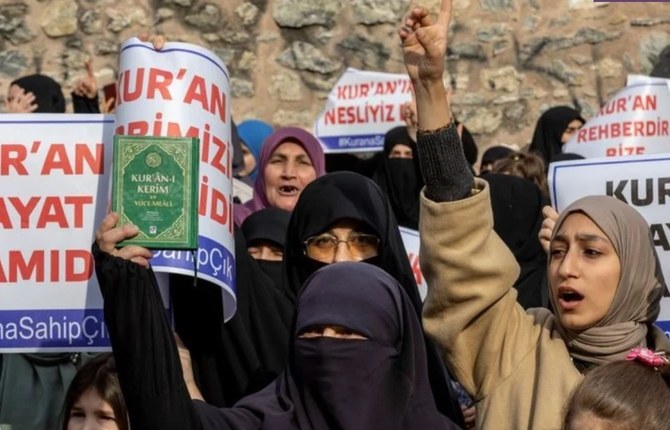STOCKHOLM: Sweden’s foreign ministry on Saturday warned Swedes in Turkiye to avoid crowds and demonstrations following protests there over the burning of the Qur’an by a far-right politician in Stockholm last week.
Last week Turkiye suspended talks with Sweden and Finland on their applications to join NATO after the protest at which Rasmus Paludan, leader of the Danish far-right political party Hard Line, burned a copy of the Qur’an outside the Turkish embassy in Stockholm.
Paludan’s actions have led to demonstrations in a number of Muslim countries as well as in Turkiye.
“Swedes in Turkiye are asked to stay updated on the development of events and to avoid large gatherings and demonstrations,” the foreign ministry said on its advice page for Swedes abroad.
“Continued demonstrations can be expected outside the embassy in Ankara and the consulate general in Istanbul in the coming days.”
After Paludan’s protest, Swedish Prime Minister Ulf Kristersson said he supported freedom of speech.
“But what is legal is not necessarily appropriate. Burning books that are holy to many is a deeply disrespectful act,” Kristersson said on Twitter.
Sweden and Finland applied last year to join NATO following Russia’s invasion of Ukraine.
They need support from all 30 members of the Alliance. Turkiye has said Sweden in particular must first take a clearer stance against what it sees as terrorists, mainly Kurdish militants and a group it blames for a 2016 coup attempt, in order for it to back NATO membership for the two Nordic countries.
Sweden tells citizens to avoid crowds in Turkiye after Qur'an burning
https://arab.news/mde3u
Sweden tells citizens to avoid crowds in Turkiye after Qur'an burning

- Last week Turkiye suspended talks with Sweden and Finland on their applications to join NATO
- "Swedes in Turkiye are asked to stay updated on the development of events and to avoid large gatherings and demonstrations," the foreign ministry said
Israeli forces demolish Palestinian facilities in Jericho

- Israeli authorities have conducted 538 demolitions in the past 12 months, totaling 1,400 structures
- Excluding East Jerusalem, there are about 3 million Palestinians and 500,000 Israeli settlers living in the West Bank
LONDON: Israeli authorities demolished a house on Thursday in the town of Deir Al-Dik, located west of Jericho in the West Bank, and issued a demolition order for another structure east of the city.
Israeli bulldozers stormed Deir Al-Dik and demolished a house belonging to a resident of Jerusalem, claiming it was built without a permit, according to the Wafa news agency.
Forces also demolished a barracks in the city that belonged to the Abu Jarar factory and issued a demolition order for another structure related to the Sinqrat palm grove, east of Jericho.
The Wall and Settlement Resistance Commission reported that the Israeli authorities conducted 538 demolitions in the past 12 months, totaling 1,400 structures. This included 304 occupied homes, 74 unoccupied homes, 270 economic facilities and 490 agricultural facilities, primarily in Hebron, Jerusalem, Ramallah, Tubas and Nablus.
Excluding East Jerusalem, which was occupied and annexed by Israel in 1967, there are about 3 million Palestinians and 500,000 Israeli settlers living in the West Bank.














